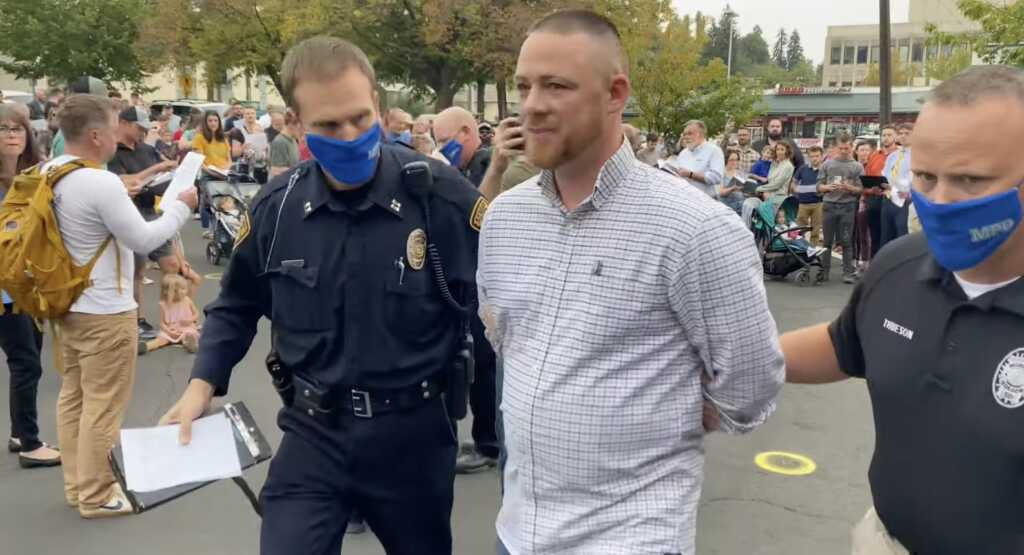A church deacon and podcaster arrested in 2020 for refusing to wear a mask at an outdoor protest recently won a resulting legal battle against officials in Moscow, Idaho.
Listen to the latest episode of CBN’s Quick Start podcast 👇
Gabriel Rench told CBN’s Faithwire about the so-called “Psalm sing” event he participated in on Sept. 23, 2020, in protest of his former mayor’s public health order, which was put in place in response to the COVID-19 pandemic and ended up landing him behind bars.
The protest, which included peaceful singing, took place outside Moscow City Hall.
“We like to sing Psalms and hymns and protest,” Rench explained. “That’s how we like to respond to city and government overreach and so we went to a Psalm sing protest.”
He said the event was specifically designed to protest the city council’s and mayor’s “unconstitutional emergency order,” which had recently been renewed. The rules purportedly impacted people’s ability to gather, including outdoors.
“When you’re outside, you had to wear a mask or stand six feet apart, so, if you weren’t wearing a mask, you had to stand six feet apart,” Rench recounted. “If you’re wearing a mask, you could walk side by side.”
While he said no one had, to that point, been cited for breaking the emergency order and no one had been arrested, the situation apparently changed that fateful day.
As soon as the singing began, Rench said cops started asking questions, and that led to a back and forth between Rench and one of the officers. Watch Rench tell the story:
“[The cop] finally said, ‘Please give me your driver’s license.’ And I said, ‘No, you’re wrong and I’m exercising [my] human rights,” Rench recounted. “And so he proceeded … to take my hymnbook away from me, to handcuff me and arrest me, and that was in America.”
Rench said he had people from all over the world email him their shock over watching video of the arrest, with one pastor overseas expressing total dismay.
“He emailed me and said, ‘I thought it was Moscow, Russia. And then I Googled it further and realized it was Moscow, Idaho, and never my wildest dreams would I’ve ever imagined someone in America getting arrested for exercising their religious freedoms,'” Rench recounted.
He shared how he was charged with violating the health ordinance, though those charges were later dismissed.
At first, Rench said he didn’t want to sue the police, but after meeting with cops and stating he was dissatisfied with their reaction to try and reconcile over what unfolded, he decided to file suit against Moscow officials, arguing his First and Fourth Amendments were violated.
“It took three years … I won my civil case against the city and the judge just lambasted my city for incompetence, for not understanding their own emergency orders, and how their own emergency order even recognized and protected my First Amendment rights,” he said.
U.S. District Court Judge Morrison C. England, Jr., chastised the city for its code enforcement and the way in which the situation was handled. The judge ordered the city to reach a settlement with Rench and two others who were detained during the 2020 protest.
“Plaintiffs should never have been arrested in the first place, and the constitutionality of what the city thought [its] code said is irrelevant,” England wrote. “The prosecutor’s charging decisions were likewise flawed.”
He added, “Somehow, every single city official involved overlooked the exclusionary language [of constitutionally protected behavior] in the ordinance.”
Rench believes his legal victory will help keep government powers in check by reminding them about the limits of their authority. This is especially pertinent due to the fact the ordinance itself had protective language exempting “any and all expressive and associative activity that is protected by the United States and Idaho Constitutions, including speech, press, assembly, and/or religious activity.”
Thus, Rench and others purportedly shouldn’t have been detained under the rules.
“The wonderful thing about my victory here with my little town in Moscow is that it’s a reminder that the mayor and city council cannot suspend your constitutional rights,” he said. “We needed that reminder.”
Rench also said he wants Christians to take a number of lessons away from his saga, urging them to be more convicted in the future about “what the Bible teaches about worship, about gathering for church.”
“We need to be able to read the story better,” he added, expressing his worries that secular forces are intent on pushing abortion and other social issues on others. “They’re out for blood. They’re trying to win a cultural war and Christians have been, I think, too passive about the cultural war.”
Rench added, “We need to be far more convicted about the Word of God in the public square than we are.”
***As the number of voices facing big-tech censorship continues to grow, please sign up for Faithwire’s daily newsletter and download the CBN News app, developed by our parent company, to stay up-to-date with the latest news from a distinctly Christian perspective.***



